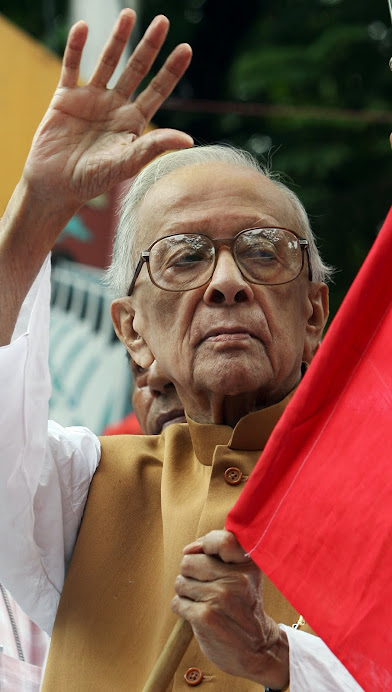By Vidya Subrahmaniam
Third-term Modi is in
the company of three who far outshine him in terms of seat and vote shares
As super hero-sized
victories go, there is clearly no one among India’s galaxy of Chief Ministers,
including the much-hailed and ostensibly Delhi-bound Narendra Modi, who can
beat the record of West Bengal's Jyoti Basu.
Jyoti Basu who was
Chief Minister for close to five terms stretching over 23 long years,
consistently registered blockbuster victories for the Left Front which held
over three-fourths of the seats in the four terms between 1977 and 1996 — 225;
228; 242 and 241 in a house of 294. Even when the numbers dipped in 1996, the
LF had a two-thirds majority, winning 202 or 68.70 per cent of the seats. The
LF’s vote share ranged from 47 per cent to 51 per cent.
Naveen Patnaik and
Sheila Dikshit are both three-time Chief Ministers. Mr. Patnaik who was in
alliance with the Bharatiya Janata Party between 2000 and 2004, completely
overshadowed his partner. The Biju Janata Dal won 81 per cent of the seats it
contested in 2000. The corresponding figure for the BJP was 60.31 per cent. The
BJD won 72.61 per cent of the seats it contested in 2004. The corresponding
figure for the BJP was 50.79 per cent. In 2009, Mr. Patnaik dumped the BJP
citing sectarian violence in Kandhamal. The move won him a bounty: The BJD won
a three-fourths majority with a seat share of 103 in the 129-member Orissa
Assembly. Mr. Patnaik, whose party polled 39 per cent of the valid votes,
achieved this feat in a three-way contest among the BJP, the BJD and the
Congress.
Ms. Dikshit was sworn
in immediately after the 1998 Delhi Assembly election which fetched the
Congress 52 of 70 seats or almost a three-fourths majority. In 2003, she won a
two-thirds majority with 47 seats, and in 2009, against all expectations, she
won 43 or 61 per cent of the seats.
On Thursday, as
results poured in from Gujarat, TV anchors competed to paint Mr. Modi in
hagiographic shades, declaring that he was headed for a two-thirds majority. As
time passed, the seat projection came down from 130 to 120 and stayed there
even though expected tally hovered between 116 and 115 on the Election
Commission of India’s website. In the end, the BJP in Gujarat wound up with 115
of 182 seats (63 per cent) — two short of the 117 it had in 2007.
Significantly, the
record for winning the highest share of seats and votes in Gujarat goes to the
Congress. In 1980, it won 141 seats for a vote share of 51.04 per cent. Madhav
Singh Solanki who became Chief Minister topped this in the next election with a
phenomenal 149 seats for a vote share of 55.55 per cent.
Published:
THE HINDU, December 22, 2012 01:09 IST
This article has been
corrected for an editing error.

